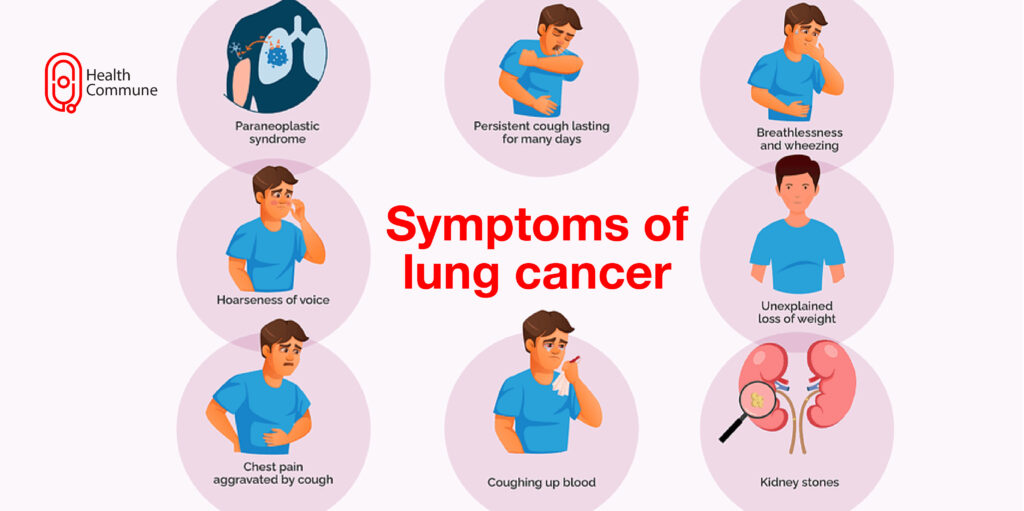Lung cancer is the fourth most common type of cancer in India. Read on to find out about the symptoms, staging, and treatment of lung cancer.
What is lung cancer?
Cancer is the uncontrolled multiplication of abnormal cells. Lung cancer is a type of cancer that begins in the lungs which, are a part of our respiratory system. In India, lung cancer constitutes around 11.6% of all new cancer cases and around 18.4% of all cancer-related deaths.
What are the symptoms of lung cancer?
In the early stages, lung cancer typically shows no symptoms. The symptoms include:
- Persistent cough lasting for many days
- Coughing up blood
- Unexplained loss of weight
- Hoarseness of voice
- Breathlessness and wheezing
- Chest pain aggravated by a cough
- Kidney stones due to increased calcium levels in the blood (because of bone resorption)
- Paraneoplastic syndrome is a group of symptoms due to the abnormal immune response of the body to cancer
What are the types of lung cancer?
Based on how the cancer cells appear under the microscope, lung cancer is mainly divided into two types:
- Non-small cell lung cancer more commonly occurs, grows, and spreads slowly. Under this, three main subtypes include adenocarcinoma, squamous cell carcinoma, and large cell carcinoma
- Small cell lung cancer is a comparatively rare type of cancer and it grows and spreads faster. It usually affects smokers
- Other uncommon cancers
What are the risk factors for lung cancer?
- Smoking: It’s the most common cause of lung cancer. Exposure to cigarette smoke causes abnormal changes in the lung, which eventually lead to cancer. Mere secondhand exposure to tobacco smoke could be a culprit as well
- Exposure to asbestos, chromium, nickel, arsenic, and polycyclic aromatic hydrocarbons
- Radiation treatment for other cancers in the chest area (for example, breast cancer)
- Inhalation of radon gas
- Family history

How is lung cancer diagnosed?
Your doctor will ask you about the details of your symptoms and perform a physical examination
- Blood tests to rule out the possibility of infections
- Imaging
- Chest X-ray
- CT scan
- PET scan
- Biopsy: A small portion of the tumour tissue is removed and observed under the microscope. There are various techniques for obtaining this tissue. It’s often done with the help of slender, flexible tubes called endoscopes or through a similar tube with a telescope fitted at one end called a bronchoscope. Other methods include guiding a needle through the chest wall into the lungs
- In addition to microscopic evaluation, the cells will be further subjected to ‘immunohistochemistry’ sometimes to identify the proteins (antigens) in the cells
What are the stages of lung cancer?
The most common staging system for cancer is called TNM staging.
- T denotes tumour size
- N denotes involvement of lymph node involvement
- M denotes the spread of cancer to distant organs in the body
- Stage I: a small tumour that has not spread to lymph nodes
- Stage II: slightly bigger tumour which has spread into nearby lymph nodes
- Stage III: the bigger size of the tumour which involves lymph nodes more extensively
- Stage IV: tumour that has spread to other body parts such as bone, brain, or liver
To which organs does lung cancer spread commonly?
- Lymph nodes
- Liver
- Bones
- Brain
- Adrenal glands (hormone-producing glands situated just above your kidneys on each side)
What are the complications of lung cancer?
- Neuropathy (numbness and tingling sensation on hands or feet due to damage to the nerves)
- Pleural effusion (Fluid build-up in the membrane that covers the lungs)
- Shortness of breath
- Coughing up blood
- Pain
- Spread to other parts of the body
What is the treatment for lung cancer?
The treatment of lung cancer is based on the stage of cancer:
- Stage I: Surgery (wedge resection: removal of the affected part of the lung which contains the tumour, plus some surrounding healthy tissue; segmental resection: removal of a larger section of the lung but not the whole lobe; lobectomy- removal of a whole lobe; pneumonectomy: removal of an entire lung)
- Stage II: Surgery followed by chemotherapy
- Stage III: Surgery with chemotherapy sometimes along with radiation therapy
- Stage IV: Usually chemotherapy and radiation therapy
Advanced treatment options
- Targeted therapy: involves the delivery of medicines that target specific genes and proteins that promote the growth and progression of cancer
- Immunotherapy: certain medicines augment the immune system to identify cancer cells as foreign to the body and destroy it
Can lung cancer be cured?
If detected at an early stage, lung cancer can be effectively treated and cured. Treatment becomes more challenging at advanced stages.
Will lung cancer recur?
The chances of recurrence depend on the type of cancer and the stage at which the cancer is diagnosed and treated. While there is always some risk of recurrence, to ensure early detection, make sure that you undergo regular follow-up and consultation.
Written By:

Dr.Sosa George
MDS An oral physician turned medical writer who writes profoundly about medicine and diseases. Read her contributions and writings about various healthcare topics.




